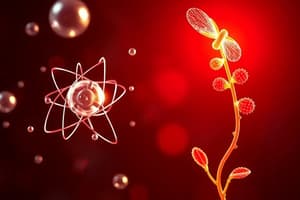Podcast
Questions and Answers
What is the focus of molecular biology?
What is the focus of molecular biology?
- Study of heredity and genetic variation
- Interactions between organisms and their environment
- Study of cellular processes and biomolecules (correct)
- Study of electric and magnetic fields
Which of the following best describes Newton's Laws of Motion?
Which of the following best describes Newton's Laws of Motion?
- They explain the relationship between motion and forces (correct)
- They demonstrate the conservation of energy in closed systems
- They dictate the behavior of electric and magnetic fields
- They detail the structure of atoms
Which branch of chemistry focuses on the properties and behaviors of molecules?
Which branch of chemistry focuses on the properties and behaviors of molecules?
- Inorganic Chemistry
- Physical Chemistry (correct)
- Analytical Chemistry
- Organic Chemistry
What is a key concept of biology that relates to maintaining a stable internal environment?
What is a key concept of biology that relates to maintaining a stable internal environment?
In physics, which of the following conservation laws is applicable in closed systems?
In physics, which of the following conservation laws is applicable in closed systems?
Flashcards are hidden until you start studying
Study Notes
Physics
- Definition: Study of matter, energy, and the fundamental forces of nature.
- Branches:
- Classical Physics: Mechanics, thermodynamics, electromagnetism.
- Modern Physics: Quantum mechanics, relativity.
- Key Concepts:
- Newton's Laws of Motion: Describes the relationship between motion and forces.
- Conservation Laws: Energy, momentum, and charge are conserved in closed systems.
- Electromagnetism: Study of electric and magnetic fields.
Biology
- Definition: Study of living organisms and life processes.
- Branches:
- Molecular Biology: Focuses on cellular processes and biomolecules.
- Ecology: Study of interactions between organisms and their environment.
- Genetics: Study of heredity and genetic variation.
- Key Concepts:
- Cell Theory: All living organisms are composed of cells.
- Evolution: The process of change in inherited traits over generations.
- Homeostasis: Mechanisms that maintain a stable internal environment.
Chemistry
- Definition: Study of substances, their properties, and the changes they undergo.
- Branches:
- Organic Chemistry: Study of carbon-containing compounds.
- Inorganic Chemistry: Study of minerals and non-organic compounds.
- Physical Chemistry: Study of the physical properties and behaviors of molecules.
- Key Concepts:
- Atomic Structure: Understanding protons, neutrons, and electrons.
- Chemical Bonding: Ionic, covalent, and metallic bonds.
- Stoichiometry: Calculating reactants and products in chemical reactions.
Physics
- Physics studies matter, energy, and how they interact through fundamental forces
- Classical Physics includes mechanics, thermodynamics, and electromagnetism
- Modern Physics includes quantum mechanics and relativity
- Newton's Laws of Motion describe the relationship between motion and forces
- Conservation Laws assert that energy, momentum, and charge remain constant in closed systems
- Electromagnetism studies electric and magnetic fields
Biology
- Biology investigates living organisms and their life processes
- Molecular Biology focuses on cellular processes and biomolecules
- Ecology examines the relationships between organisms and their environment
- Genetics studies heredity and the variations in genetic information
- Cell Theory states that all living organisms are composed of cells
- Evolution explains the gradual changes in inherited traits over generations
- Homeostasis describes the mechanisms responsible for maintaining a stable internal environment in living organisms
Chemistry
- Chemistry explores substances, their properties, and the changes they undergo
- Organic Chemistry focuses on compounds containing carbon
- Inorganic Chemistry studies compounds that don't contain carbon, primarily minerals
- Physical Chemistry investigates the physical properties and behaviors of molecules
- Atomic Structure describes the composition of atoms with protons, neutrons, and electrons
- Chemical Bonding investigates different types of bonds, such as ionic, covalent, and metallic bonds
- Stoichiometry involves calculations to determine the quantities of reactants and products in chemical reactions
Studying That Suits You
Use AI to generate personalized quizzes and flashcards to suit your learning preferences.




